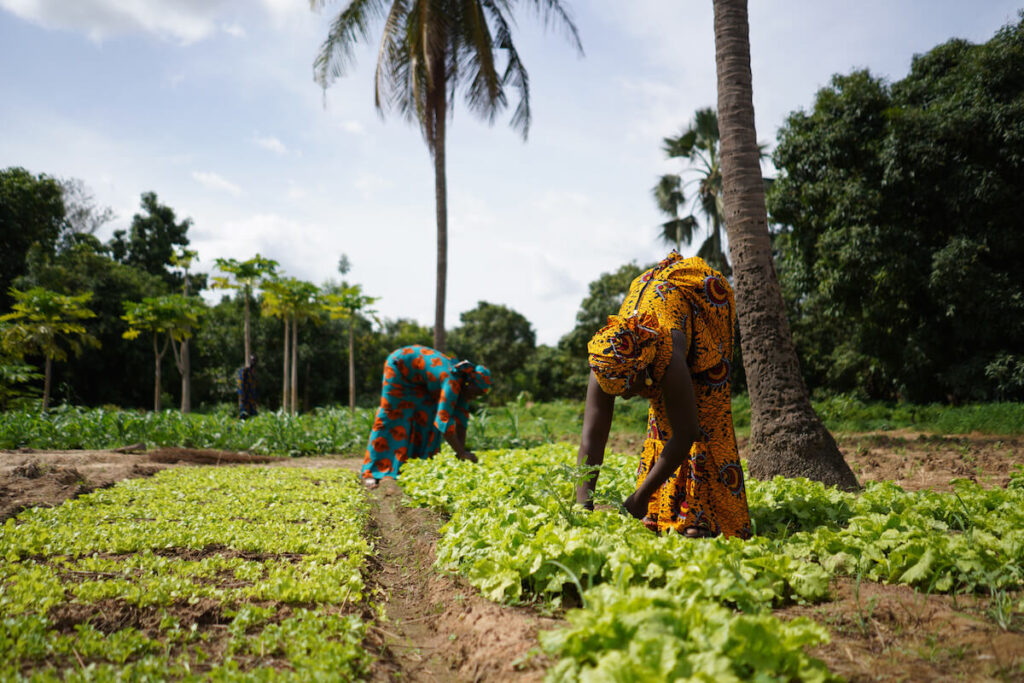
Scrolling through Instagram these days, I’ve noticed a pattern that has emerged since COVID-19 prompted lockdowns across the globe. With movement restricted, many social media users in the US have engaged in culinary adventures. New experiments in the kitchen abound despite the noted shortage of ingredients like flour on supermarket shelves.
But what I haven’t been seeing on my social media feed on the food front is much more dire: COVID-19 will push up to an estimated half billion people into poverty across the globe, threatening food security. Prior to the pandemic, approximately 820 million people were chronically hungry. Now, the World Food Program estimates that by the end of 2020, 265 million people in low and middle-income countries will be under the threat of starvation.
A Challenge for a Continent
These issues are particularly acute in several countries in Africa, where job losses and income losses are affecting food security, defined as access to sufficient, safe, and nutritious food. In a recent Africa Dialogues webinar, hosted by Dalberg Advisors and Amref Health Africa and moderated by Lolem Ngong and Edwin Macharia, Professor Hamadi Iddi Boga of the Ministry of Agriculture, Livestock, and Fisheries in Kenya; Sara Menker, Founder and CEO of Gro Intelligence; and Monica Musonda, Founder and CEO of Java Foods, explored how the pandemic is disrupting agricultural supply chains and impacting smallholder farmers and vulnerable populations across the continent.
As Menker highlighted, there isn’t a lack of food around the world. Food insecurity, rather, is rooted in a massive distribution problem and a widespread inability to afford food, now exacerbated by COVID-19. Foreign exchange reserves across the African continent are at an all-time low due to the pandemic. In a weakened macroeconomic environment, the cost of imports has increased, and although some African markets are experiencing food insecurity to a greater extent than others, net importers of calories are finding themselves in an increasingly precarious situation. In Zambia, for example, the price of fortified cereal for children has increased to $6. Groups including informal workers, microentrepreneurs, and women tend to be the most adversely impacted by such price fluctuations.
Informal workers, microentrepreneurs and women tend to be the most adversely impacted by price fluctuations.
Musonda noted during the webinar that up to 60 percent of wages from informal work in Africa are used to buy food. Finding themselves without work, or with fewer working hours due to COVID-related restrictions on physical movement, informal workers and microentrepreneurs face increasing food insecurity, and women, who allocate more of their own resources to other members of the household during hardship, are disproportionately affected.
How Does Financial Inclusion Come into Play?
As a well-documented enabler of food security, financial inclusion has an important role to play in the mitigation of COVID-19’s harms to vulnerable groups. Here, I highlight a few of many considerations for financial inclusion initiatives when taking action to reduce food insecurity.
Supporting SMEs and Smallholder Farmers
Propping up small and medium-sized business is an important consideration for financial inclusion and, by extension, food security in Africa. SMEs form an integral part of the food supply chain in Africa. According to Musonda, SMEs handle 64 percent of food, much of which is fresh and perishable, on the continent. These are the foods that are crucial, but we must do more to ensure that SMEs stay alive during this time of crisis.
This is where financial service providers (FSPs) play an important role. FSPs need to address both short-term and longer-term financing options for SMEs. In the short-term, as FSPs themselves are struggling with liquidity constraints, the role of other actors, such as impact investors, development finance institutions, and policymakers, will be important to filling the void in available liquidity. But beyond liquidity through FSPs, there is a broader role for governments to play when it comes to food security.
In Kenya, the government has created an ecosystem of SMEs to support smallholder farmers in a mutually beneficial initiative that connects nodes of the supply chain. According to Prof. Boga, 90 percent of farmers in Kenya are smallholder farmers. To support this population, the government has created an ecosystem of SMEs to support them, and has implemented an e-voucher program in which farmers receive vouchers on their mobile phones to exchange for partially subsidized farm supplies based on their individual and household needs.
Promoting and Strengthening Cash Transfer Systems
Government-to-person (G2P) and person-to-person (P2P) cash transfers are an effective strategy to increase both financial inclusion and food security. NGOs, governments, and the private sector are working together to promote and strengthen this most important vehicle for quickly delivering crucial cash to low-income households and individuals. Evidence from several large-scale evaluations shows that as households receive more in cash transfers, they spend more on food, with positive impacts on meals consumed and dietary quality.
The regulatory environment and payment infrastructure in many countries can present a challenge for massive payouts, but the financial inclusion community views the current crisis as an opportunity to fast-track improvements to payments systems, particularly through digital payments ecosystems. While digitalization is promising, however, CFI’s Alex Rizzi cautions that rushed pushes to go digital may harm the poor, and it will continue to be important to put base-of-the-pyramid consumers at the center of considerations for digital cash payments.
Countries with strong DFS infrastructures are taking the lead in implementing systems to help people afford food.
In Africa, countries with strong DFS infrastructures are taking the lead in implementing systems to help the base of the pyramid afford food and other living expenses. The Western Africa Central Bank (BCEAO) is promoting the use of electronic payment tools by making it easier for people to open a mobile money account and by making P2P transfers free. Kenya’s National Treasury appropriated an additional 10 billion Kenyan schillings, or $100 million, to support for the elderly, orphans and other vulnerable groups through cash transfers. In addition, fee waivers on P2P mobile money transactions on M-PESA were approved. The Moroccan Economic Watch Committee activated a mobile payment device for cash transfers directly to an estimated 3 million informal workers, while in Tunisia, the government is offering one-off cash transfers to households with members working in the informal sector and housing the elderly.
To support governments and markets where the digital payment infrastructure is still developing, initiatives like the World Bank’s G2Px focus on bringing together expertise across sectors to scale G2P payments responsibly. NGOs such as the World Food Program continue to employ cash transfers in coordination with partners.
Supporting Women’s Financial Inclusion as a Means to Greater Food Security
Research indicates that within households, women are at a greater risk of being food insecure. In times of hardship, such as the current pandemic, they are more likely to reduce their own food consumption to leave enough for men and boys. However, access to secure financial services has the potential to promote women’s empowerment and advance food security. Women with bank accounts are likely to have greater bargaining power to allocate more household resources to purchasing nutritious food. Increasingly, many donors and policymakers are recognizing the need to shift cash transfers to women as one approach to tackling food insecurity. This provides an on-ramp for digital financial services while improving convenience and confidentiality of these payments.
Will our documentation of this moment in time capture the resilience, cooperation, and hard work of the individuals and institutions responding to this unprecedented crisis? Food security is a critical basic need, and financial inclusion is an important means of achieving it. With financial services digitizing at a breakneck pace, we mustn’t forget our most basic needs and how inclusive finance can serve them.









